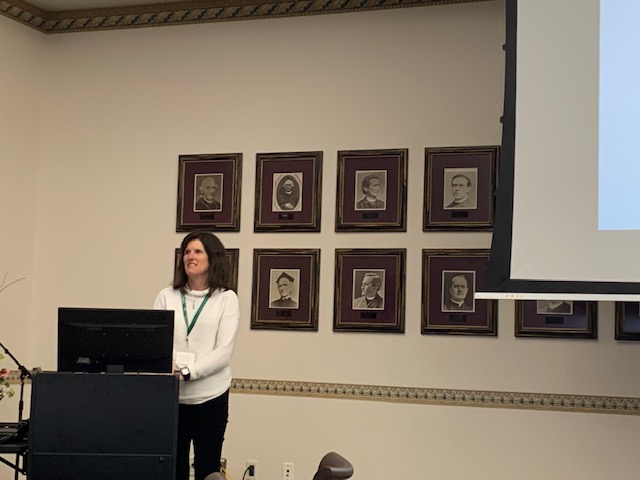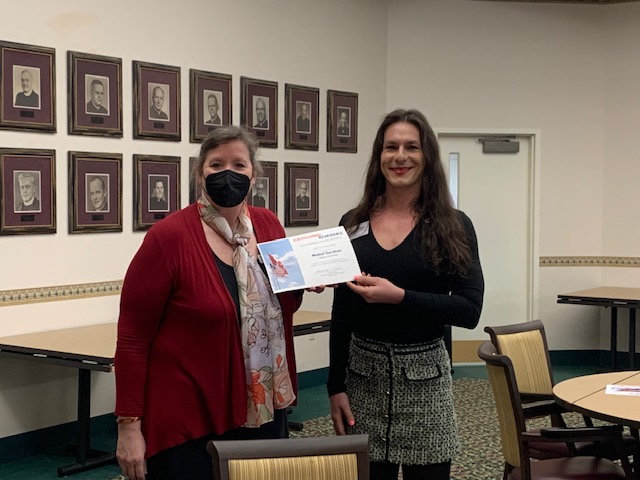Niagara University hosts the 30th annual Crossing Borders Conference on March 24-25
Organizers from Niagara University and Brock University recently hosted a multidisciplinary, undergraduate and graduate student conference on Canada-U.S. relations. Participating students and panel moderators from the region came from Brock University, Daemen University, Laurentian University, Niagara University, the University at Buffalo, the University of New Brunswick, the University of Pittsburgh at Bradford, Western University of Ontario, and Wilfrid Laurier University. The conference was sponsored by the Office of the Provost, the Department of History, and the Ontario campus of Niagara University as well as Brock University’s Centre for Canadian Studies. The main planning for the conference was led by Dr. Shannon Risk, Chair of the Department of History at Niagara University, and Ms. Elaine Aldridge-Low, Administrative Assistant, Centre for Canadian Studies, at Brock University.

Keynote speaker Dr. Stephanie Bangarth, professor of History at King’s University College at the University of Western Ontario, spoke at the conference.
Students presented their work, which focused on psychology of Casinos in Canada and the U.S., political science topics centered on populism and campaign funding, tracking crime at the border and beyond, history and language, security and mobility rights at the border, and a reassessment of border policies. Dr. Tim Ireland, Provost at Niagara University, welcomed the students, moderators, and supporters at the luncheon, remarking that the conference overlapped with U.S. President Biden’s summit with Canadian Prime Minister Justin Trudeau. He noted that the two leaders continued a long tradition of cooperation between the two countries.
The keynote speaker was Dr. Stephanie Bangarth, Professor of History at King’s University College at the University of Western Ontario. Her work, titled, “A Strong Re-enforcement of the American Initiative”: The 1970s, Human Rights and Foreign Policy, and Canadian Trade (In)Action, focused on the 1970s rhetoric of the Canadian government as “peacekeeper nation” while simultaneously supporting business initiatives with major human rights abuser countries like South Africa. She also noted a political family dynasty in Canadian Parliament actively fighting to ensure the government’s rhetoric matched its actions. Dr. Bangarth said of her presentation, “this paper begins a conversation on the origins of legislated government and corporate social responsibility in Canadian human rights history and in a comparative framework with parallel American initiatives. From the pinnacle of Canada’s principled stand on apartheid in the 1980s to the nadir of the largest arms contract in Canadian history signed with Saudi Arabia a few years ago, it is important to highlight how the defense of human rights has been articulated and circumvented.”
Winning the “best student paper” was PhD student Mabel Gardner from Western University of Ontario. Her work centered on a Canadian journalist, Gladys Arnold, who fostered a dynamic career, chronicling the Free French forces led by General Charles de Gaulle during the Second World War. Arnold, supported by the wealthy Sifton family, also served as a voice for white settler colonialism in her reporting for the Regina Leader Post. The Sifton family urged white Canadians and immigrants to populate the western prairies at the expense of indigenous people and other ethnic minorities. The contest judges, Dr. Monroe Eagles, Professor of Political Science at the University at Buffalo, and Dr. Dan Malleck, Professor of Health Sciences and Director of the Centre for Canadian Studies at Brock University, highlighted Gardner’s “well-written analysis, backed by careful and original archival research” as a “compelling illustration of how one journalist’s career was shaped and advanced by Canada’s exclusionary immigration and settlement policies and by her receipt of the patronage of the Siftons.”

PhD student Mabel Gardner (right) from Western University of Ontario won the Best Student Paper award. Niagara University associate professor Dr. Shannon Risk presented Gardner with the award.
Each year, the Crossing Borders Conference emphasizes a supportive experience for students, recognizing that some students are presenting their scholarly work for the first time in a public arena. For thirty years, the conference organizers have provided the platform for emerging scholars and policy makers that help to define the Canadian-U.S. relationship for decades to come. The conference will return in the spring of 2024, hosted by Brock University.